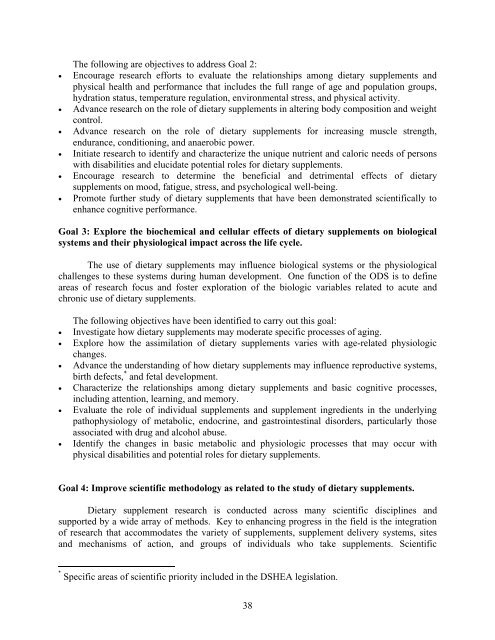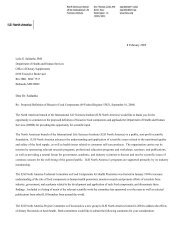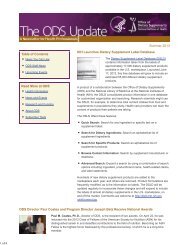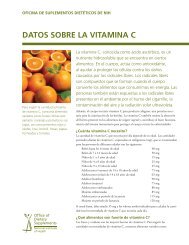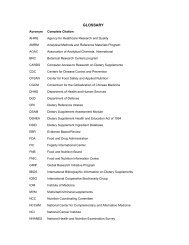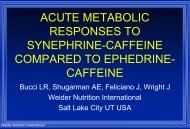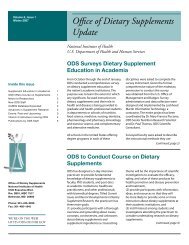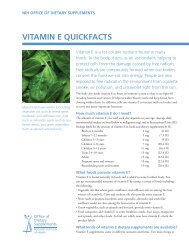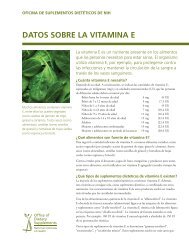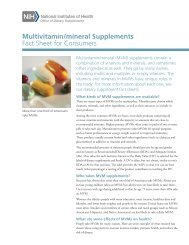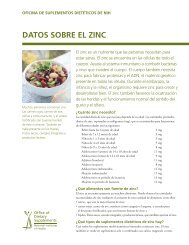status report - Office of Dietary Supplements - National Institutes of ...
status report - Office of Dietary Supplements - National Institutes of ...
status report - Office of Dietary Supplements - National Institutes of ...
Create successful ePaper yourself
Turn your PDF publications into a flip-book with our unique Google optimized e-Paper software.
The following are objectives to address Goal 2:<br />
• Encourage research efforts to evaluate the relationships among dietary supplements and<br />
physical health and performance that includes the full range <strong>of</strong> age and population groups,<br />
hydration <strong>status</strong>, temperature regulation, environmental stress, and physical activity.<br />
• Advance research on the role <strong>of</strong> dietary supplements in altering body composition and weight<br />
control.<br />
• Advance research on the role <strong>of</strong> dietary supplements for increasing muscle strength,<br />
endurance, conditioning, and anaerobic power.<br />
• Initiate research to identify and characterize the unique nutrient and caloric needs <strong>of</strong> persons<br />
with disabilities and elucidate potential roles for dietary supplements.<br />
• Encourage research to determine the beneficial and detrimental effects <strong>of</strong> dietary<br />
supplements on mood, fatigue, stress, and psychological well-being.<br />
• Promote further study <strong>of</strong> dietary supplements that have been demonstrated scientifically to<br />
enhance cognitive performance.<br />
Goal 3: Explore the biochemical and cellular effects <strong>of</strong> dietary supplements on biological<br />
systems and their physiological impact across the life cycle.<br />
The use <strong>of</strong> dietary supplements may influence biological systems or the physiological<br />
challenges to these systems during human development. One function <strong>of</strong> the ODS is to define<br />
areas <strong>of</strong> research focus and foster exploration <strong>of</strong> the biologic variables related to acute and<br />
chronic use <strong>of</strong> dietary supplements.<br />
The following objectives have been identified to carry out this goal:<br />
• Investigate how dietary supplements may moderate specific processes <strong>of</strong> aging.<br />
• Explore how the assimilation <strong>of</strong> dietary supplements varies with age-related physiologic<br />
changes.<br />
• Advance the understanding <strong>of</strong> how dietary supplements may influence reproductive systems,<br />
birth defects, * and fetal development.<br />
• Characterize the relationships among dietary supplements and basic cognitive processes,<br />
including attention, learning, and memory.<br />
• Evaluate the role <strong>of</strong> individual supplements and supplement ingredients in the underlying<br />
pathophysiology <strong>of</strong> metabolic, endocrine, and gastrointestinal disorders, particularly those<br />
associated with drug and alcohol abuse.<br />
• Identify the changes in basic metabolic and physiologic processes that may occur with<br />
physical disabilities and potential roles for dietary supplements.<br />
Goal 4: Improve scientific methodology as related to the study <strong>of</strong> dietary supplements.<br />
<strong>Dietary</strong> supplement research is conducted across many scientific disciplines and<br />
supported by a wide array <strong>of</strong> methods. Key to enhancing progress in the field is the integration<br />
<strong>of</strong> research that accommodates the variety <strong>of</strong> supplements, supplement delivery systems, sites<br />
and mechanisms <strong>of</strong> action, and groups <strong>of</strong> individuals who take supplements. Scientific<br />
* Specific areas <strong>of</strong> scientific priority included in the DSHEA legislation.<br />
38


